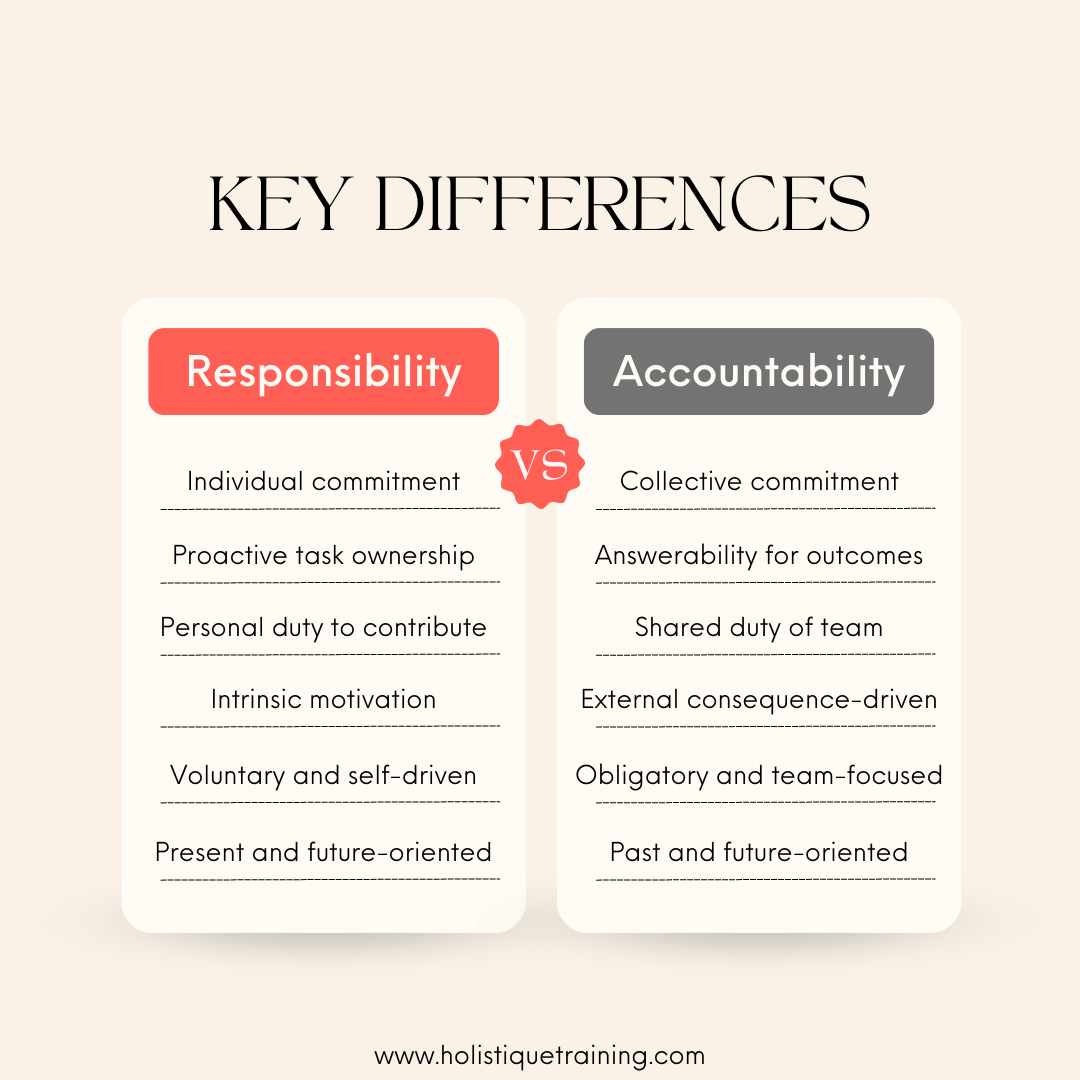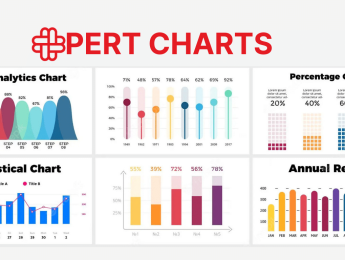- Table of Contents
- Introduction
- What Is Responsibility in the Workplace?
- What Is Accountability in the Workplace?
- Key Differences Between Responsibility and Accountability
- 1. Nature of Commitment
- 2. Individual vs. Collective Focus
- 3. Timing and Perspective
- 4. Motivation vs. Consequence
- 5. Role in Organisational Culture
- Benefits of Responsibility in the Workplace
- Elevated Employee Morale
- Increased Job Satisfaction
- Fostering a Collaborative Culture
- Enhanced Employee Engagement
- Cultivation of a Positive Work Environment
- Advantages of Accountability in the Workplace
- Catalyst for Continuous Improvement
- Reinforces Trust and Transparency
- Drives Goal Alignment and Clarity
- Encourages Proactive Problem-Solving
- Strengthens Team Cohesion
- Performance Recognition and Fair Evaluation
- How Do Irresponsible Leaders Impact the Workplace?
- Erosion of Trust
- Diminished Employee Morale
- Stunted Professional Growth
- Increased Organisational Risk
- Cultural Decay
- Resistance to Change
- Tips for Building a Responsible and Accountable Team
- 1. Clearly Define Roles and Expectations
- 2. Foster Open Communication
- 3. Set Measurable Goals
- 4. Lead by Example
- 5. Implement a System of Feedback and Recognition
- 6. Cultivate a Learning Mindset
- 7. Encourage Cross-Functional Collaboration
- 8. Provide Adequate Resources and Support
- 9. Establish a System of Consequences and Rewards
- 10. Conduct Regular Team Building Activities
- In Conclusion
Introduction
In the intricate tapestry of a thriving workplace, responsibility and accountability emerge as the cornerstones of a successful team. These two concepts, though often used interchangeably, bear distinct characteristics that contribute uniquely to the dynamics of a professional setting. In this exploration, we'll delve into the nuanced realms of responsibility and accountability, uncovering their definitions, manifestations, and the pivotal role they play in fostering a robust work environment.
What Is Responsibility in the Workplace?
Responsibility in the workplace is a multifaceted concept that extends beyond merely completing assigned tasks. It is the intrinsic commitment of individuals to take ownership of their duties and contribute to the overall success of the team. Employees showcasing responsibility are proactive, reliable, and possess a genuine dedication to the quality of their work.
Leaders, too, play a pivotal role in displaying responsibility. They set the tone for the team, exhibiting a strong work ethic, and paving the way for others to follow suit. Responsible leaders prioritise effective communication, foster a positive work culture, and actively seek solutions to challenges rather than laying blame.
What Is Accountability in the Workplace?
Accountability complements responsibility, representing a more formal aspect of commitment in the workplace. While responsibility centres around an individual's intrinsic motivation, accountability introduces a layer of obligation and answerability for one's actions or the actions of the team.
Employees demonstrating accountability go beyond completing tasks; they accept the consequences of their decisions and actions. In leadership, accountability entails being transparent about decisions, acknowledging mistakes, and implementing corrective measures. It is the backbone of trust within a team and serves as a catalyst for continuous improvement.
Key Differences Between Responsibility and Accountability
Understanding the nuances that distinguish responsibility from accountability is pivotal for fostering a balanced and effective workplace dynamic. While these two concepts are interconnected, they serve distinct roles in shaping individual and collective behaviour within an organisation.

1. Nature of Commitment
Responsibility centres around an individual's proactive commitment to fulfilling their duties and contributing to the team's objectives. It is an intrinsic motivation that drives employees to take ownership of their tasks. In contrast, accountability introduces a more formal and structured aspect of commitment. It involves being answerable for the outcomes, whether positive or negative, and accepting the consequences of one's actions or decisions.
Responsibility is personal and voluntary, driven by an individual's sense of duty. On the other hand, accountability implies a shared obligation, extending beyond personal commitment to encompass the collective performance of the team.
2. Individual vs. Collective Focus
Responsibility is primarily individual-centric. It emphasises personal initiative and the proactive contribution of each team member. In a responsible workplace culture, employees are motivated to excel in their roles, showcasing dedication and diligence.
Accountability, on the other hand, has a more collective focus. It involves acknowledging the shared responsibility for the team's performance. While individuals are answerable for their specific tasks, accountability extends to the team's overall outcomes. It reinforces the idea that success and failures are collective, encouraging a sense of unity among team members.
3. Timing and Perspective
Responsibility is often associated with the proactive phase of work. It comes into play during task execution, when individuals take the initiative to ensure the successful completion of their assignments. It is a forward-looking concept that emphasises each team member's present and future contributions.
Accountability, in contrast, operates retrospectively to a certain extent. It involves looking back at the outcomes and taking responsibility for the results, whether they meet expectations or fall short. Accountability prompts reflection on past actions, fostering a culture of learning and continuous improvement.
4. Motivation vs. Consequence
Responsibility is driven by internal motivation. Individuals who embrace responsibility are self-motivated to excel in their roles and contribute positively to the team's success. This reflects a sense of pride and dedication to one's work.
Accountability introduces an external factor—the consequence of actions. Individuals and teams are accountable not only for their successes but also for their failures. This external dimension encourages a heightened awareness of the impact of actions on the broader organisational goals.
5. Role in Organisational Culture
Responsibility contributes to the development of a positive and proactive organisational culture. Employees who feel a personal connection to their work are more likely to be engaged, fostering a collaborative and supportive environment.
Conversely, accountability is crucial in building a culture of transparency and trust. When individuals and teams hold themselves accountable for their actions, it establishes a foundation for open communication and a shared commitment to improvement.
In essence, responsibility and accountability, while interconnected, bring different dimensions to the workplace. Recognising and appreciating these distinctions allows organisations to harness the full potential of both concepts, creating a robust and harmonious work environment. Integrating responsibility and accountability is the key to unlocking a culture of excellence and sustained success within any organisation.
Benefits of Responsibility in the Workplace
In the intricate dance of organisational dynamics, responsibility emerges as a guiding light, illuminating the path to a more engaged, motivated, and harmonious workplace. The benefits of fostering a culture of responsibility extend far beyond the completion of tasks; they permeate the very essence of a team, shaping its identity and contributing to overall success.
Elevated Employee Morale
Responsibility is a powerful catalyst for boosting employee morale. When individuals feel a sense of ownership over their work, they are more likely to be invested in its success. This intrinsic motivation fosters a positive atmosphere, where employees take pride in their contributions and derive satisfaction from a well-done job.
A workforce with elevated morale becomes a collective force, radiating positivity and resilience even in the face of challenges. This heightened spirit creates a ripple effect, influencing the overall workplace culture and contributing to a more enjoyable and fulfilling professional experience.
Increased Job Satisfaction
Responsibility and job satisfaction are intricately linked. Employees who actively take ownership of their roles find greater satisfaction in their work. This satisfaction is not solely derived from completing tasks but is deeply rooted in the understanding that their contributions are meaningful and valued by the team.
Job satisfaction, in turn, translates into increased retention rates and a more stable workforce. When employees find fulfilment in their responsibilities, they are more likely to stay committed to the organisation, reducing turnover and the associated recruitment and training costs.
Fostering a Collaborative Culture
A workplace infused with a culture of responsibility naturally nurtures collaboration and teamwork. When individuals proactively contribute to the team's goals, they inspire others to do the same. This collaborative spirit creates an environment where ideas flow freely, and team members support each other in achieving collective objectives.
Responsibility breaks down silos and encourages cross-functional collaboration. Team members recognise that they are part of something larger than their individual tasks, fostering a sense of unity and shared purpose. This collaborative culture enhances creativity, problem-solving, and overall team effectiveness.
Enhanced Employee Engagement
Responsibility is a key driver of employee engagement. Engaged employees are those who feel a deep connection to their work and the organisation. When individuals are responsible for specific aspects of their roles, they become more engaged in the company's day-to-day operations and long-term goals. This, ultimately, impacts company growth. In fact, according to Monitask, highly engaged employees experience a remarkable 23% increase in profitability for their company.
Engaged employees are not just passive participants; they actively seek opportunities to contribute and make a positive impact. This heightened engagement translates into increased productivity, as employees are more likely to go above and beyond their basic job requirements when they feel a sense of responsibility for the organisation's success.
Cultivation of a Positive Work Environment
Responsibility plays a pivotal role in shaping the overall work environment. A workplace where individuals take responsibility for their actions and contributions tends to be more positive and constructive. This positivity extends beyond the completion of tasks; it influences how challenges are approached and how successes are celebrated.
In a positive work environment, challenges are viewed as opportunities for growth rather than insurmountable obstacles. The collective responsibility mindset encourages problem-solving and a can-do attitude, creating a workplace where individuals feel supported and inspired to do their best work.
In short, the benefits of responsibility in the workplace are manifold. A culture of responsibility sets the stage for a vibrant and successful professional journey, from elevating morale and increasing job satisfaction to fostering collaboration and enhancing employee engagement. Organisations that prioritise and cultivate responsibility among their team members are likely to reap the rewards of a motivated, cohesive, and high-performing workforce.
Advantages of Accountability in the Workplace
Accountability is a sturdy framework in the intricate tapestry of organisational success, fortifying the bonds of trust, transparency, and continuous improvement. Beyond being a mere check-and-balance system, accountability offers a multitude of advantages that are essential for a workplace's growth and resilience.
Catalyst for Continuous Improvement
Accountability is a driving force behind a culture of continuous improvement.When individuals and teams hold themselves accountable for their actions and outcomes, it creates fertile ground for learning and growth. Failures and setbacks are not viewed as endpoints but as opportunities to evaluate, adjust, and enhance strategies for future success.
A workplace that values accountability becomes inherently adaptable, resilient, and forward-thinking. It encourages a mindset that seeks lessons in every experience, fostering a culture where innovation and progress thrive.
Reinforces Trust and Transparency
Trust is the cornerstone of any successful team or organisation, and accountability is the foundation of trust. When individuals and teams consistently demonstrate accountability, it creates a transparent environment where actions align with words, and commitments are honoured.
Accountability diminishes ambiguity and promotes open communication. Team members are more likely to trust one another when they know that everyone is willing to be answerable for their contributions. This trust, in turn, solidifies the team's foundation, enabling it to navigate challenges with cohesion and integrity.
Drives Goal Alignment and Clarity
Accountability ensures that every team member is aligned with organisational goals and objectives. When individuals understand the impact of their contributions on the broader mission, it creates a sense of purpose and direction. Each team member becomes a vital part of the collective journey toward success.
Clearly defined roles and responsibilities and accountability eliminate confusion and ambiguity. Team members know what is expected of them, and this clarity fosters a more efficient and focused approach to achieving shared goals.
Encourages Proactive Problem-Solving
Challenges are not avoided or swept under the rug in an accountable workplace. Instead, they are met head-on with a proactive problem-solving mindset. When individuals take ownership of their actions, they are more likely to confront issues, seek solutions, and collaborate with others to overcome obstacles.
Accountability transforms setbacks into stepping stones for improvement. It promotes a culture where team members are empowered to address issues constructively, contributing to a resilient and solution-oriented work environment.
Strengthens Team Cohesion
Accountability is a unifying force that strengthens the bonds between team members. A sense of shared responsibility emerges when everyone holds themselves accountable for their contributions. This shared responsibility fosters a collaborative spirit, where individuals support one another in achieving common objectives.
Team cohesion is not just about working together; it's about trusting that each team member is committed to the collective success. Accountability nurtures this trust, creating a cohesive and supportive team environment where individuals feel empowered and motivated to excel.
Performance Recognition and Fair Evaluation
Accountability ensures that individual and collective contributions are acknowledged and recognised. In a workplace where accountability is valued, achievements are celebrated, and efforts are duly rewarded. This recognition not only boosts morale but also serves as a motivator for sustained high performance.
Additionally, accountability contributes to fair performance evaluations which is, apparently, a common issue among employees. In fact, statistics show that a whopping 70% of employees express that their managers lack objectivity when assessing their performance. When individuals, especially leaders, are accountable for their actions, evaluations become objective and reflective of actual contributions. This fairness fosters a sense of justice and equality among team members, further enhancing the overall workplace culture.
In short, the advantages of accountability in the workplace extend far beyond organisational checks and balances. Accountability is a linchpin for success, from driving continuous improvement and reinforcing trust to aligning goals and fostering proactive problem-solving. Organisations that prioritise and cultivate accountability among their team members are well-positioned to navigate challenges, achieve their objectives, and sustain long-term growth.
How Do Irresponsible Leaders Impact the Workplace?
Leadership is the compass that guides an organisation, and the conduct of leaders profoundly shapes the culture and effectiveness of the workplace. The Workplace Accountability Study by Partners in Leadership, as cited by Culture Partners, encompassing years of research and involving over 40,000 participants across diverse industries, reveals a striking finding: 84% of respondents identify leaders' behaviour as the paramount factor influencing accountability within their organisations. Leaders not only affect accountability in the workplace, though. When leaders exhibit irresponsibility, the repercussions ripple throughout the organisation, affecting morale, productivity, and overall success. Understanding how irresponsible leadership impacts the workplace is crucial for fostering a healthy and thriving organisational environment.
Erosion of Trust
Trust is the cornerstone of any successful team or organisation. Irresponsible leaders erode trust by failing to uphold their commitments, neglecting accountability, and shirking responsibility. When team members witness leaders evading their duties or avoiding consequences, it undermines the foundation of trust, creating a toxic atmosphere of uncertainty and scepticism.
In such an environment, collaboration becomes challenging, and team members may become reluctant to share ideas or express concerns. The erosion of trust hampers communication and stifles creativity, hindering the organisation's ability to adapt and innovate.
Diminished Employee Morale
Irresponsible leaders cast a shadow over employee morale. When leaders fail to model a strong work ethic or take responsibility for their actions, it demoralises the entire team. Employees may feel disheartened, undervalued, or even demotivated, leading to a decline in overall job satisfaction.
Low morale is contagious, impacting the entire workplace. It can result in increased absenteeism, reduced engagement, and a lack of enthusiasm for the organisation's goals. The negative ripple effect of diminished morale can compromise the collective effort needed to achieve success.
Key Characteristic | Description |
Proactive Approach | Takes initiative to address challenges. |
Effective Communication Skills | Clearly conveys ideas and fosters understanding. |
Leads by Positive Example | Models responsibility for team members. |
Encourages Continuous Improvement | Promotes learning and growth within the team. |
Acknowledges and Learns from Mistakes | Demonstrates accountability and a learning mindset. |
Table 1: Characteristics of a Responsible Leader
Stunted Professional Growth
Irresponsible leaders hinder professional growth by setting a poor example for their team members. When leaders neglect responsibility, they send a message that mediocrity is acceptable. This, in turn, stifles ambition and discourages employees from investing in their personal and professional development.
A workplace led by irresponsible leaders may lack mentorship and guidance, inhibiting the potential for skill enhancement and career advancement. Employees may feel overlooked or undervalued, leading to a stagnant professional environment that hampers both individual and organisational growth.
Increased Organisational Risk
Leadership is inherently tied to decision-making, and irresponsible leaders may make decisions without due diligence or considering consequences. This can expose the organisation to unnecessary risks, ranging from financial mismanagement to reputational damage.
Irresponsible leaders may also neglect to address issues promptly, allowing them to escalate into larger problems. This lack of timely intervention increases the likelihood of crises that could have been mitigated with responsible and proactive leadership.
Cultural Decay
Leaders set the tone for organisational culture, and irresponsible leaders contribute to the decay of a healthy workplace culture. When leaders evade responsibility, it becomes acceptable behaviour within the organisation. This cultural decay can manifest as a lack of accountability, blame-shifting, and a reluctance to take ownership of challenges.
A culture devoid of responsibility becomes a breeding ground for inefficiency and dysfunction. It stifles innovation, collaboration, and the overall well-being of the workforce, making it difficult for the organisation to adapt to change or navigate complex challenges.
Resistance to Change
Irresponsible leaders may resist necessary changes or fail to communicate their rationale effectively. This can lead to resistance from the workforce, as employees may be sceptical about the leadership's ability to navigate change responsibly.
A workplace with leaders who avoid responsibility may struggle to implement strategic initiatives, hindering the organisation's ability to adapt to evolving market dynamics. This resistance to change can impede growth and competitiveness, disadvantaging the organisation in a rapidly changing business landscape.
In summary, irresponsible leaders cast a long shadow over the workplace, impacting trust, morale, professional growth, organisational risk, cultural health, and adaptability to change. Recognising the detrimental effects of irresponsible leadership is essential for organisations to foster a positive and effective work environment, one where responsibility, accountability, and integrity are embraced at all levels of leadership.
Tips for Building a Responsible and Accountable Team
Building a team that embodies responsibility and accountability is a strategic endeavour that requires deliberate effort and thoughtful leadership. Here are ten actionable tips to cultivate a culture of responsibility and accountability within your team:
1. Clearly Define Roles and Expectations
Establishing clear roles and expectations is fundamental to building a responsible and accountable team. Ensure that each team member understands their specific responsibilities and expectations regarding the quality and timeliness of their work. This clarity reduces confusion, aligns individual efforts with organisational goals, and forms the foundation for accountability.
2. Foster Open Communication
Encourage open and transparent communication within the team. Create an environment where team members feel comfortable expressing their ideas, concerns, and feedback. Open communication promotes a culture of accountability as issues can be addressed promptly, and solutions can be collaboratively developed.
3. Set Measurable Goals
Define measurable and realistic goals for both individuals and the team as a whole. Measurable goals provide a clear benchmark for success, making it easier to evaluate performance and hold team members accountable. Regularly review progress towards these goals, celebrating achievements and adjusting strategies as needed.
4. Lead by Example
Leadership sets the tone for the entire team. Demonstrate responsibility and accountability in your actions and decisions. When team members witness leaders taking ownership of challenges and being accountable for outcomes, it creates a positive ripple effect throughout the organisation.
5. Implement a System of Feedback and Recognition
Establish a structured feedback system that includes constructive criticism and positive reinforcement. Provide regular feedback on individual and team performance, emphasising areas of improvement and acknowledging achievements. Recognition reinforces a culture of responsibility and motivates team members to deliver their best consistently.
6. Cultivate a Learning Mindset
Encourage a mindset of continuous learning and improvement. Emphasise that mistakes are growth opportunities, not reasons for punishment. When team members view challenges as learning experiences, they are more likely to take responsibility for their actions and seek innovative solutions.
7. Encourage Cross-Functional Collaboration
Promote collaboration across different functions and departments. Cross-functional collaboration fosters a sense of shared responsibility for the organisation's success. Team members from diverse backgrounds can bring fresh perspectives, enhancing problem-solving and innovation.
8. Provide Adequate Resources and Support
Ensure your team has the necessary resources and support to fulfil their responsibilities. Lack of resources can be a significant barrier to accountability. By providing the tools, training, and support needed, you empower your team to meet their commitments effectively.
9. Establish a System of Consequences and Rewards
Define a fair system of consequences for failing to meet responsibilities and rewards for exemplary performance. A balanced approach to consequences and rewards reinforces accountability by highlighting the impact of actions on individual and team outcomes.
10. Conduct Regular Team Building Activities
Invest in team-building activities that foster a sense of camaraderie and shared purpose. Team building enhances interpersonal relationships, creating a supportive environment where team members are more likely to hold themselves and each other accountable.
Incorporating these tips into your leadership approach can create a team culture that values responsibility and accountability. Remember that building a responsible and accountable team is an ongoing process that requires commitment, consistency, and a shared dedication to the organisation's goals.
In Conclusion
Responsibility and accountability are twin pillars that uphold workplace success. When integrated harmoniously, they create a dynamic and resilient team capable of overcoming challenges and achieving long-term success. By cultivating these virtues, organisations can build a culture of trust, collaboration, and unwavering commitment to excellence.
Finally, in mastering the delicate interplay of responsibility and accountability, propel your career to new heights with our course, ‘Perfecting Your Management and Leadership Skills.’ Delve into strategies that empower you to lead with a balance of responsibility and accountability, unlocking the secrets to fostering a high-performing team. Navigate through real-world scenarios, refining your leadership prowess and honing the skills essential for organisational excellence. Join us on a transformative journey and redefine your leadership narrative with confidence and impact. Enrol now and chart the course to become a leader that drives sustained success.
























